1988 Countdown #45: Phil Collins, “A Groovy Kind of Love”
(New to the countdown? Catch up here.)
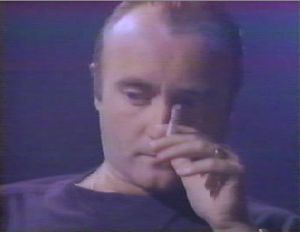 A door opens at the back of a large room. We see a man in silhouette, and a shaft of light illuminating a chair. In silence, the man walks down a staircase into what appears to be a disused warehouse. He gets closer and we see that it’s noted percussionist Phil Collins, in gray slacks and a black t-shirt. He walks up to an enormous film projector and flips a switch.
A door opens at the back of a large room. We see a man in silhouette, and a shaft of light illuminating a chair. In silence, the man walks down a staircase into what appears to be a disused warehouse. He gets closer and we see that it’s noted percussionist Phil Collins, in gray slacks and a black t-shirt. He walks up to an enormous film projector and flips a switch.
Film rolls: specifically, scenes from the movie Buster, in which Collins stars, in the greatest acting role for a drummer since Caveman. This is our fourth video in the countdown to include footage from a film (counting Dirty Dancing in “Hungry Eyes,” It Couldn’t Happen Here in “Always on My Mind,” and Moonwalker in “Smooth Criminal,” but not Caddyshack II in “Nobody’s Fool,” because the movie bombed and they edited out the footage by the time of this countdown).
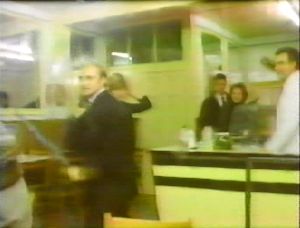 I have never seen Buster, so I will attempt to divine the plot based on the edited footage: Phil Collins walks up to a car with two armfuls of flowers. There’s a newspaper headline about a robbery. Collins walks across a rainy street holding a raincoat over him and his wife, and then waves his umbrella around like a sword in a fish-and-chips shop. The setting appears to be 1960s London. So he has a cover identity as the world’s greatest flower salesman, but is actually an agent for the British Secret Service, licensed to kill with an umbrella.
I have never seen Buster, so I will attempt to divine the plot based on the edited footage: Phil Collins walks up to a car with two armfuls of flowers. There’s a newspaper headline about a robbery. Collins walks across a rainy street holding a raincoat over him and his wife, and then waves his umbrella around like a sword in a fish-and-chips shop. The setting appears to be 1960s London. So he has a cover identity as the world’s greatest flower salesman, but is actually an agent for the British Secret Service, licensed to kill with an umbrella.
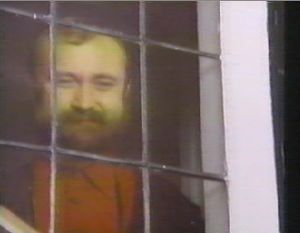 The scene shifts to a cottage. His wife is gardening. Collins gives her a thumbs-up from the window, with a big beard, which he has grown to demonstrate that with facial hair, he looks remarkably like Robin Williams. Collins leaves on a boat, off to kill somebody with his poison-tipped brolly; she blinks back tears.
The scene shifts to a cottage. His wife is gardening. Collins gives her a thumbs-up from the window, with a big beard, which he has grown to demonstrate that with facial hair, he looks remarkably like Robin Williams. Collins leaves on a boat, off to kill somebody with his poison-tipped brolly; she blinks back tears.
Somewhat later, she opens a gift box to find a pearl necklace, a passport, and a BOAC ticket, proving that the acronym (for British Overseas Airways Corporation, now known as British Airways) had life beyond “Back in the USSR.” Collins wears suspenders and looks pleased. They fly to Bermuda (I’m guessing because they’re big fans of Help! and are retracing the Beatles’ footsteps). Various people hug and kiss: on the street, in bed, on a boat.
In an outdoor restaurant in Bermuda, Collins gets up abruptly, knocking over the table. His wife looks distressed, either because he’s drunk or because he’s about to go kill somebody with her parasol. Then a sweaty Collins examines his passport, wondering whether the life of an assassin/flower salesman is really worthwhile. More embracing by Collins and his wife leads us to believe the answer is yes. And so ends the montage.
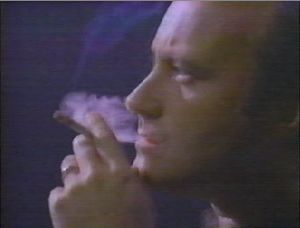 Collins watches all this while sitting in a chair, smoking a cigarette. (I had always assumed cigarettes were banned by MTV; either I was wrong or Collins was a big enough star that they let it slide.) He looks melancholy the whole time. Maybe he’s not happy with his performance? Maybe he’s trying to remember the name of the lead actress (Julie Walters, it turns out, most famous for playing Rita in Educating Rita)? Maybe he’s sad about how Mike Rutherford never mended his relationship with his father before he died and is making a mental note that Mike might try writing a song about it?
Collins watches all this while sitting in a chair, smoking a cigarette. (I had always assumed cigarettes were banned by MTV; either I was wrong or Collins was a big enough star that they let it slide.) He looks melancholy the whole time. Maybe he’s not happy with his performance? Maybe he’s trying to remember the name of the lead actress (Julie Walters, it turns out, most famous for playing Rita in Educating Rita)? Maybe he’s sad about how Mike Rutherford never mended his relationship with his father before he died and is making a mental note that Mike might try writing a song about it?
“A Groovy Kind of Love” is a cover of the 1965 number-two single by the Mindbenders (without Wayne Fontana), slowed down and made melancholy. I always disliked Phil Collins on general principle (okay, let’s make it specific and call it the Sussudio Principle), although like all right-thinking people I enjoyed “In the Air Tonight.” What turned me around on him was a 2007 episode of This American Life, in which Starlee Kine decided that she needed to write a breakup song in order to get over her own bad breakup, and somehow got Phil Collins to be her guru. He was warm and wise and kind, so the least I can do is admit to having a soft spot for “Easy Lover.”
This is a professional pop ballad, not as good “Against All Odds,” much better than “Another Day in Paradise.” The lyrics are upbeat, but Collins’ vocal reading is sorrowful; I think that gives the single an extra fillip, but if you said it was just emotionally discordant, I’d have a hard time arguing with you.
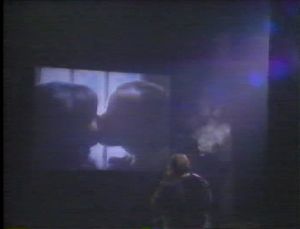 While Collins watches Buster footage in his chair, with clouds of smoke gathering over him, we also get images of him singing in closeup, giving us plenty of time to consider his throat (clean-shaven) and his hair (receding fast in 1988, but not gone yet). When the film reel ends, Collins is still smoking. He stands up and walks out of the warehouse, with his hands in his pockets. We don’t actually see him dispose of the cigarette, so we can only hope that it’s not in his pocket, setting his pants on fire.
While Collins watches Buster footage in his chair, with clouds of smoke gathering over him, we also get images of him singing in closeup, giving us plenty of time to consider his throat (clean-shaven) and his hair (receding fast in 1988, but not gone yet). When the film reel ends, Collins is still smoking. He stands up and walks out of the warehouse, with his hands in his pockets. We don’t actually see him dispose of the cigarette, so we can only hope that it’s not in his pocket, setting his pants on fire.
“A Groovy Kind of Love” hit #1 on the Billboard singles chart, and stayed there for two weeks. (The movie flopped.) You can watch the video here.
posted 20 January 2011 in 1988 and tagged Phil Collins, This American Life. 4 comments



January 20th, 2011 at 2:02 pm
Phil Collins is sort of a poor man’s Elton John, isn’t he? He’d be a lot easier to take if he didn’t always act as if he were so frickin’ lovable.
January 20th, 2011 at 4:11 pm
Collins gives her a thumbs-up from the window, with a big beard, which he has grown to demonstrate that with facial hair, he looks remarkably like Robin Williams.
Only funnier.
Agreed on that This American Life episode, all the way — except I never really hated Phil.
The critical consensus on Collins has really undergone quite a swing over the last quarter-century. I found that in the ’80s, Boomer critics gave him a pass, but GenX-ers largely came to hate him and his ubiquity, which blossomed into real loathing in the ’90s when the X-ers emerged as critics and cultural gatekeepers. (And media figures: witness the withering South Park episode Trey Parker and Matt Stone did in 2000 ripping Collins, mostly because he won an Oscar against them.) But after 2000 or so, opinion on Collins improved markedly, to the point where even X-ers seem to be coming out of the woodwork in appreciating him and Millennials of the American Idol generation near-love the guy. All those “Against All Odds” covers!
(You seem to indicate you like not only “Easy Lover” but also “Odds,” which for all its bombast I’d say is enduring ballad. I also have a soft spot for this Mindbenders cover, but I’d rank it well below “Odds” and about par with “Paradise.” Honestly, Collins only started to piss me off when the ballads, particularly the ones he brought back to Genesis, started to run together: “Do You Remember,” “Hold on My Heart,” etc. Who can tell any of that shit apart?)
Anyway, mark my words: That other balding gnome, Moby — admired in the ’90s, loathed in the ’00s — is going to undergo the same renaissance.
January 20th, 2011 at 4:43 pm
Yes, I think “Against All Odds” is a great song, deserving of its status as a standard.
I didn’t mind Collins’ ubiquity circa Live Aid, when it seemed charming that he played on both sides of the Atlantic, but all that late Genesis dreck really mounted up after a while.
I think his crowning achievement, however, is probably his production of Frida’s “I Know There’s Something Going On.”
January 21st, 2011 at 9:11 pm
You wouldn’t really know it from MTV, who were still rather populist at this point. This video did rush to the top of the top 20 countdown, although the videos that would follow it at the top spot, “Wild Wild West” by the Escape Club, “Bad Medicine” by Bon Jovi, and “Desire” by U2, were ultimately much bigger, and will be seen way later here on the year end. His following video from the soundtrack, “Two Hearts” also topped both Billboard and MTV early the following year, though it wouldn’t be seen on the ’89 year end chart. Too many big videos that year, perhaps?
“Another Day In Paradise” rushed to the top on MTV by early December and spent 2 weeks there, was ranked #82 for the year, partly because of the newness factor. Though it was his biggest ever Billboard single, actually ranking within the 100 biggest singles of all time a few years ago, one of the few singles from the late ’80s to do so.
Sorry about all the seemingly pointless chart trivia if you don’t care for it. It’s just too tempting to indulge where it has some remote kind of relevance.
Anyhoo, my young self felt the same way about Phil Collins that the South Park kids on Ritalin felt. Speaking of SP, I still remember Trey saying he didn’t care if he lost as long as it wasn’t Phil Collins, and IIRC that Aimee Mann would have been a good alternative. No arguments there… “Save Me” is classic.